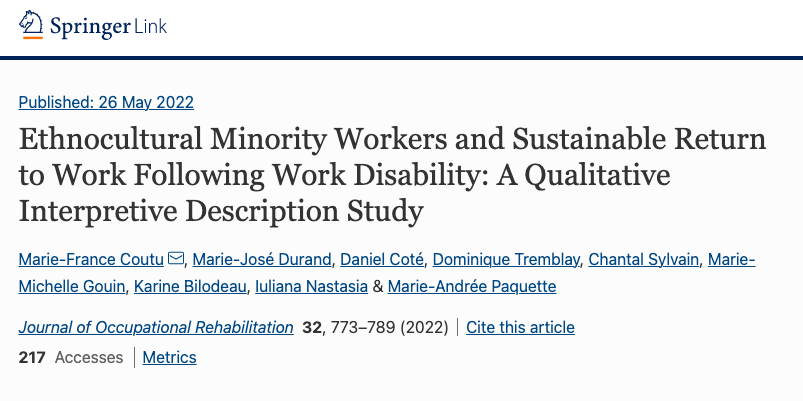Ethnocultural Minority Workers and Sustainable Return to Work Following Work Disability: A Qualitative Interpretive Description Study
Abstract
Purpose This article provides a state-of-the-art review of issues and factors associated with the sustainable return to work (S-RTW) of ethnocultural minority workers experiencing disability situations attributable to one of four major causes: musculoskeletal disorders, common mental disorders, other chronic diseases or cancer. Methods Using an interpretive description method, an integrative review was conducted of the literature on ethnocultural factors influencing S-RTW issues and factors associated with these four major work-disability causes. An initial review of the 2006–2016 literature was subsequently updated for November 2016–May 2021. To explore and contextualize the results, four focus groups were held with RTW stakeholders representing workplaces, insurers, the healthcare system and workers. Qualitative thematic analysis was performed. Results A total of 56 articles were analyzed and 35 stakeholders participated in four focus groups. Two main findings emerged. First, belonging to an ethnocultural minority group appears associated with cumulative risk factors that may contribute to vulnerability situations and compound the complexity of S-RTW. Second, cultural differences with respect to the prevailing host-country culture may generate communication and trust issues, and conflicts in values and representations, in turn possibly hindering the establishment of positive relationships among all stakeholders and the ability to meet workers’ needs. Being a woman in these groups and/or having a lower level of integration into the host country’s culture also appear associated with greater S-RTW challenges. Conclusions Based on our findings, we recommend several possible strategies, such as the cultural humility model, for preventing differences from exacerbating the already significant vulnerability situation of some ethnocultural minority workers.

